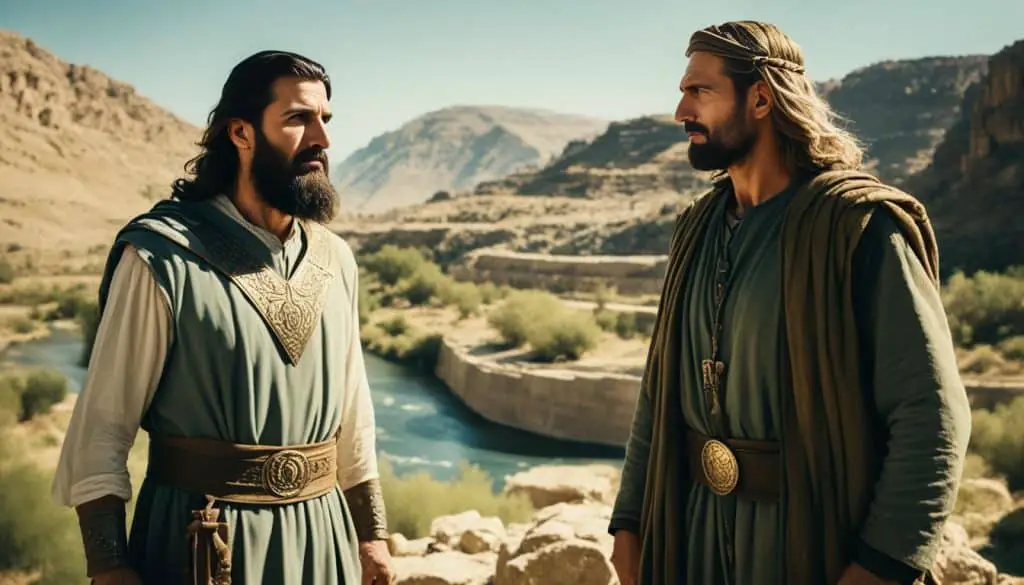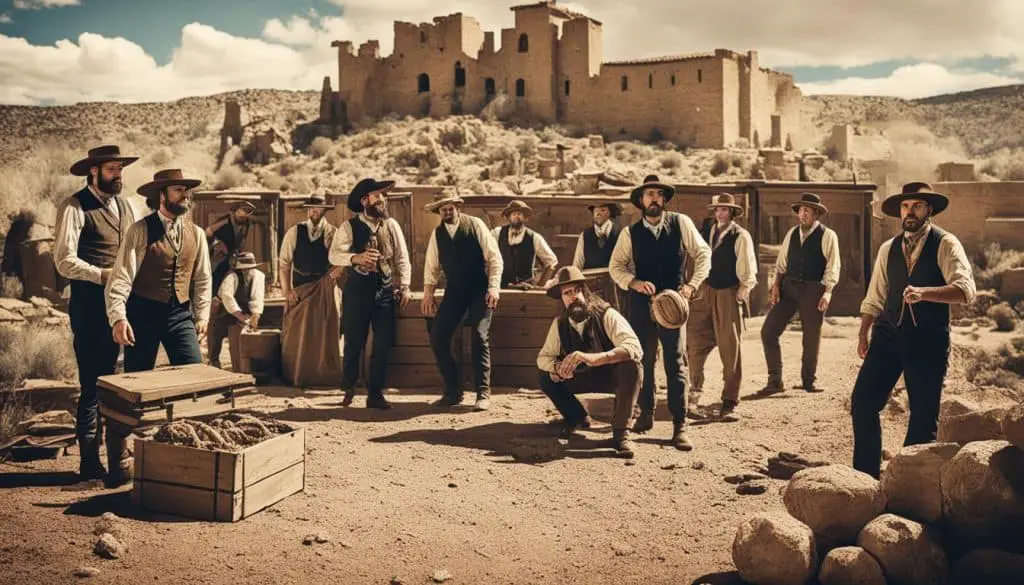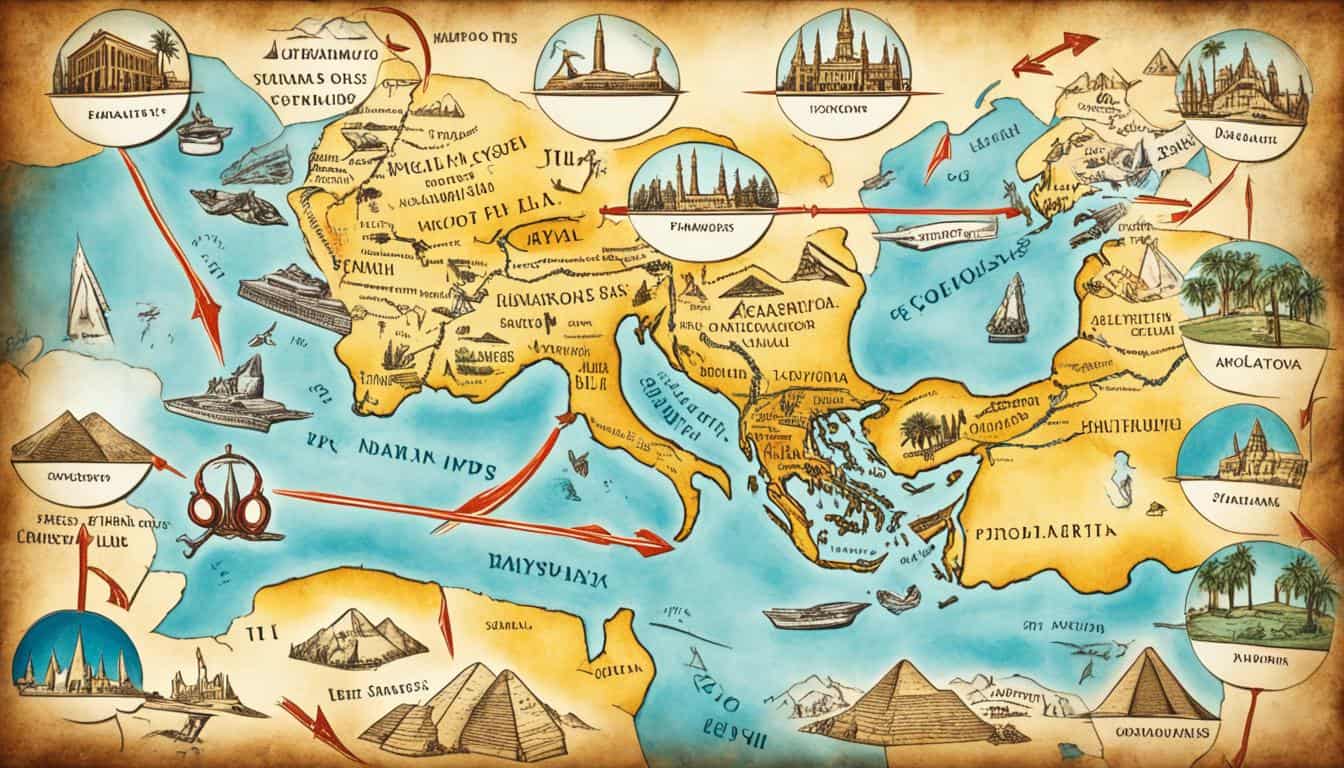Table of Contents
Have you ever thought about how foreign nations helped the prophets in the Bible? It’s interesting to see people from other places helping God’s messengers. The Bible tells amazing stories of how nations helped prophets in their missions from God. We’ll look into ten times when countries were key to the prophets’ journeys.
Foreign nations in the Bible have always played an important role. They’ve not only influenced events but also shown how God’s plans connect everyone. For example, Rahab’s bravery and Cyrus’ decision both helped the Israelites. These stories highlight the impact of people from different places on the prophets’ lives.
Now, let’s explore stories like Rahab helping the spies and Cyrus supporting the rebuilding of Jerusalem. These interactions with prophets like Joshua and Elisha were crucial. We’ll see how these encounters changed history and our views on foreign involvement in the Bible. So, prepare to learn from these remarkable stories of cooperation.
Get ready for an exciting look into the Bible. We’ll see how foreign nations aided prophets in their important tasks. Let’s open our minds to new insights on how foreign help shaped biblical events.
Rahab and the Israelite Spies (Joshua 2)
The story of Rahab and the Israelite spies in Joshua shows how anyone, even from another land, can help those in need. Rahab was a brave Canaanite woman who lived in Jericho. When Israelite spies came to her city, she sheltered and protected them. Her quick thinking and bravery saved their lives.
The Israelites were getting ready to take over Jericho. Joshua sent two spies to check out the city. They needed a safe place to hide and picked Rahab’s home. The king found out and told Rahab to hand them over.
“By faith Rahab the prostitute did not perish with those who were disobedient, because she had given a friendly welcome to the spies.” – Hebrews 11:31
Rahab didn’t give them up. Instead, she cleverly hid them on her roof. When the king’s men came asking about the spies, she lied to protect them. This lie helped the spies get away safely and tell Joshua important information (Joshua 2:4-6).
But hiding the spies wasn’t all Rahab did. She also made a promise. She asked the spies to protect her and her family when Jericho was under Israeli attack. The spies agreed and told her to put a red cord in her window as a sign.
Rahab kept her end of the agreement. She put the red cord in her window. Because of this signal, her family was spared when the Israelites invaded Jericho (Joshua 2:12-21).
Rahab’s bravery and faith in the God of the Israelites made a big difference. She was willing to risk it all to save the spies. This shows her deep trust in God’s plan.
Naaman and Elisha (2 Kings 5)
Naaman, a famous commander, had leprosy. He heard about Elisha, a prophet known for his miracles. Naaman traveled to Israel, looking for a cure. He asked Elisha for help. This journey teaches us about faith, miracles, and how God can help us when we ask.
Elisha told Naaman to wash in the Jordan River seven times. Naaman was surprised by the simple solution. But he trusted Elisha and did as he was told. His leprosy disappeared after he followed Elisha’s advice.
“Then went he down, and dipped himself seven times in Jordan, according to the saying of the man of God: and his flesh came again like unto the flesh of a little child, and he was clean.” – 2 Kings 5:14
Naaman was healed because he trusted Elisha. This miracle changed not just his body, but also his heart. It made him believe in the God of Israel.
After his healing, Naaman said, “…Behold, now I know that there is no God in all the earth, but in Israel…” (2 Kings 5:15). He learned that the God of Israel was the true God.
Naaman’s story shows that those from other places can find God too. It shows how important it is to believe and follow God.

Lessons from Naaman and Elisha
There are many lessons in Naaman and Elisha’s story:
- God’s healing power is for everyone, no matter where they’re from.
- Listening to and trusting God brings wonderful changes.
- God often uses unexpected ways to show his power.
- When we see what God does, it can change how we think and believe.
Their story tells us how much a prophet’s words can mean. It shows that God’s love and power is for everyone, everywhere.
| Key Points | Details |
|---|---|
| Prophet | Elisha |
| Foreign Commander | Naaman |
| Healing | Instructions given by Elisha cured Naaman’s leprosy |
| Acknowledgment | Naaman acknowledged the God of Israel after his healing |
Ruth and Boaz (Ruth 1-4)
The book of Ruth tells a touching story about kindness. It’s about Boaz, who showed compassion to Ruth, a woman from another land. Ruth and her mother-in-law, Naomi, left Moab because of a famine.
They came to Bethlehem where Ruth started working in Boaz’s fields. This move changed her life more than she knew it would.
“The LORD repay you for what you have done, and a full reward be given you by the LORD, the God of Israel, under whose wings you have come to take refuge.”
Boaz was so impressed with Ruth’s devotion to Naomi. He made sure Ruth had what she needed while working. He also ensured her safety, going beyond what was required by the law.
Seeing Ruth’s outstanding character, he eventually married her. This joined him into the family line leading to King David.
The story of Ruth and Boaz is about compassion and generosity. It’s a beautiful example of what can happen when different people unite in support and respect.
Ruth’s Journey to Israel and Boaz’s Kindness
Ruth chose to stay with Naomi despite the hardships. Her dedication and love were key to winning Boaz’s heart.
Boaz didn’t just provide for Ruth. He showed true care for her and honored their God. By marrying Ruth, he helped in King David’s lineage.
The Lineage of King David
Ruth becoming part of King David’s lineage shows God’s amazing plan. It shows His will to include those who truly seek Him, no matter where they come from.
| Key Points | Lessons Learned |
|---|---|
| Ruth’s journey exemplifies loyalty and devotion. | Acts of kindness can have lasting impacts. |
| Boaz’s kindness extends beyond legal requirements. | Inclusivity and compassion transcend cultural boundaries. |
| Ruth’s inclusion in the lineage of David highlights God’s sovereignty. | God can work through anyone regardless of their background. |
Nebuchadnezzar’s Respect for Daniel (Daniel 3)
King Nebuchadnezzar respected Daniel because of his faith in God. Daniel’s story in the Bible shows us how powerful faith can be. Nebuchadnezzar saw Daniel’s loyalty to his God in many moments.
Nebuchadnezzar once commanded three friends of Daniel – Shadrach, Meshach, and Abednego – to worship his idol. They refused and were thrown into a fire. In a surprising turn of events, Nebuchadnezzar saw them in the fire, unharmed, and beside them, “a son of the gods.”
This amazed Nebuchadnezzar and changed his heart. He then acknowledged that Daniel’s God is the real powerful God:
“Praise be to the God of Shadrach, Meshach, and Abednego, who has sent his angel and rescued his servants! They trusted in him and defied the king’s command and were willing to give up their lives rather than serve or worship any god except their own God.”
Daniel 3:28
Cyrus’ Edict to Rebuild Jerusalem (Ezra 1)
Cyrus, the Persian king, was key in helping the Israelites rebuild Jerusalem. He issued an edict that let them go back home and reconstruct their temple. Isaiah’s prophecies matched this, showing it was meant to be.
This event showed how Cyrus and the Israelites worked together in their history. It proved divine help was there, making sure God’s plan was followed. Cyrus’ decision made it possible for Isaiah’s prophecies to come true, showing the power of faith.
“This is what Cyrus king of Persia says: ‘The Lord, the God of heaven, has given me all the kingdoms of the earth, and he has appointed me to build a temple for him at Jerusalem in Judah. Any of his people among you may go up to Jerusalem in Judah and build the temple of the Lord, the God of Israel, the God who is in Jerusalem, and may their God be with them.'” – Ezra 1:2-3
Cyrus’ edict did more than let the Israelites fix their city. It showed how leaders and different nations can work together. This helps God’s plans move forward.
The Israelites, by working on Jerusalem, found hope and unity. This made their faith and strength grow. They continued in their promise to God.
Rebuilding Jerusalem Table
| Key Elements | Details |
|---|---|
| King’s Edict | Cyrus’ decree allowing the Israelites to return and rebuild. |
| Prophetic Fulfillment | The realization of Isaiah’s prophecy through Cyrus’ decree. |
| Cultural Restoration | The revival of the Israelites’ cultural and spiritual identity. |
| Political Alliances | Showcasing strategic relationships between nations. |
| Renewed Faith | A sense of unity and hope for the chosen nation. |

The Queen of Sheba Visits Solomon (1 Kings 10)
The Queen of Sheba visiting Solomon shows us his wisdom and wealth. He is famous in biblical history.
Sheba’s queen heard of Solomon’s wisdom and wealth. So, she traveled to Jerusalem with many valuable gifts. These gifts included spices, gold, and precious stones. They showed her respect for Solomon.
When she met Solomon, they had deep talks. She brought hard questions to test his wisdom. She was amazed by his smart answers.
“The report I heard in my own country about your achievements and your wisdom is true. But I did not believe these things until I came and saw with my own eyes. Indeed, not even half was told me; in wisdom and wealth you have far exceeded the report I heard.”
Her visit helped both their nations trade and share culture. The queen’s gifts showed the honor they both held.
This important meeting changed history. It showed nations working together could do great things. Solomon’s impact brought many to see his wisdom and wealth.

| Gifts brought by the Queen of Sheba | Value |
|---|---|
| Spices | Priceless |
| Gold | Priceless |
| Precious Stones | Priceless |
The Shunammite Woman and Elisha (2 Kings 4)
The Shunammite woman and Elisha’s tale highlights the power of kindness. She came from Aram and was wealthy. The Shunammite woman provided Elisha with a place to stay and food while he was traveling.
For her kindness, Elisha gave her a special blessing – a son. This was a miracle that filled the woman and her husband with joy. It shows how acts of kindness, no matter where they come from, can bring blessings beyond just one person.
“And when the child had grown, he went out one day to his father among the reapers. And he said to his father, “Oh, my head, my head!” The father said to his servant, “Carry him to his mother.” And when he had lifted him and brought him to his mother, the child sat on her lap till noon, and then he died. And she went up and laid him on the bed of the man of God and shut the door behind him and went out.”
This story underlines how lives from diverse backgrounds can be closely intertwined. It illustrates the remarkable link between Elisha’s blessing of a son and the Shunammite woman’s generous spirit.

| Actions | Results |
|---|---|
| The Shunammite woman extended her hospitality to Elisha | Elisha blessed her with a son |
| The woman’s son was brought to Elisha when he fell ill | The child died |
| The woman laid her dead son on the bed of the man of God | The child was restored to life by Elisha |
The Gibeonites’ Deception (Joshua 9)
The tale of the Gibeonites’ trick in Joshua 9 is quite intriguing. It shows how a foreign nation used clever tactics to fool the Israelites. The Gibeonites, who lived nearby, pretended to come from a far-off land. They disguised themselves and brought old clothes, moldy bread, and broken wineskins. This trick made it look like they had journeyed a long way (Joshua 9:3-13).
The Gibeonites said to Joshua, “We have come from a far country. Now therefore, make a covenant with us.” – Joshua 9:6
Joshua and the leaders of Israel believed the Gibeonites’ lie and made a peace deal with them. They promised not to harm the Gibeonites (Joshua 9:14). Later, they found out the truth. The Gibeonites lived close by, in the land the Israelites were told to take over. This news shocked Joshua and the leaders, but they kept their promise. They decided to honor the treaty they had signed, even though they were tricked (Joshua 9:15-20).
This unusual ending of cooperation and keeping their word shows the Israelites’ dedication to doing what is right, even when it’s hard. This story shows how they put a high value on keeping their promises and respecting peace with others. This included nations that weren’t their friends.

The Peace Treaty Between Israelites and Gibeonites
| Parties Involved | Nature of the Agreement |
|---|---|
| The Israelites | Promised to spare the lives of the Gibeonites and not harm them |
| The Gibeonites | Promised to serve the Israelites in a subservient role |
This table gives a quick look at the peace treaty between the Israelites and the Gibeonites. It shows that both sides were serious about keeping the peace. They each promised to do their part and live peacefully together.
The Wife of Potiphar Protects Joseph (Genesis 39)
In the early story of Joseph in Egypt, a key character stands out. She’s from a different culture but plays a vital role in Joseph’s fate. This tale from the Book of Genesis shows how an outsider can help fulfill divine plans.
Joseph, a young Hebrew, was sold into slavery by his brothers. In Egypt, he caught the eye of Potiphar, an Egyptian official. Potiphar put Joseph in charge of his affairs because of his integrity and skills.
Things changed when Potiphar’s wife tried to seduce Joseph. He refused, saying it would be a sin against God to give in.
“Day after day, Potiphar’s wife tried to seduce Joseph, but he refused. ‘How could I do such a wicked thing and sin against God?’ Joseph asked.”
His rejection angered her, leading to false accusations and Joseph’s unjust imprisonment. But, her action saved his life. Instead of pushing for a harsh punishment, she let him live.
The wife of Potiphar knew Joseph was innocent. Yet, she didn’t seek his destruction. Her choice to protect him shows divine intervention, what many call ‘a higher power.’
This story explores the power of international relationships. It shows that divine protection works through the actions of the least expected people during hard times.
Joseph’s Time in Egypt
Joseph’s journey in Egypt was difficult, from slavery to imprisonment. His steadfast faith and divine purpose led to a remarkable rise. He became crucial during a famine, saving Egypt and its neighbors through wise resource management.
Joseph’s life is a reminder of overcoming obstacles with faith. It shows how a divine mission can impact the world profoundly, even through hardship and false accusations.

| Section | Key Contributions |
|---|---|
| Early Life | Joseph sold as a slave |
| Interpreting Dreams | Joseph’s gift of dream interpretation |
| Adversities | False accusation by Potiphar’s wife |
| Rise to Power | Joseph’s appointment as Pharaoh’s second-in-command |
| Famine Management | Joseph’s strategy to conserve resources |
| Reconciliation | Reunion with his brothers and father |
Despite the challenges Joseph faced, his story inspires hope. It shows how the divine plan can lead to redemption and forgiveness. His tale teaches us about the mysterious ways others can aid us on our path.
The Ethiopian Eunuch and Philip (Acts 8)
The book of Acts tells the story of a meeting between an Ethiopian eunuch and Philip. This Ethiopian official met with Philip.
The eunuch was returning to Ethiopia after paying a visit to Jerusalem. Sitting in his chariot, he was reading a section from the book of Isaiah aloud.
“Do you understand what you are reading?” Philip asked. The Holy Spirit had guided Philip to the eunuch’s chariot.
The eunuch said, “How can I know, unless someone explains it to me?”
The eunuch then invited Philip to join him and asked for help understanding the passage. This gave Philip a chance to tell him about Jesus.
Philip showed how the Isaiah passage was about Jesus Christ. The eunuch was deeply touched and became a Christian.
The eunuch was so moved by Philip’s words that he wanted to be baptized. To show his commitment, they looked for water. There, Philip baptized him.
This story shows the power of a chance meeting on a spiritual journey. Philip’s decision to follow the Holy Spirit led to an important conversion. It showed that the Christian message was for everyone, no matter their background.
Key Takeaways:
- The Ethiopian eunuch, a high official, encountered Philip the evangelist while traveling back to Ethiopia.
- Philip explained the Scriptures, sharing the Gospel of Jesus Christ.
- The eunuch’s conversion to Christianity led to his baptism and symbolized his dedication to his newfound faith.
- This account emphasizes the transformative power of encountering the Gospel, regardless of one’s position or nationality.

Conclusion
The Bible shows us how important other countries were in helping prophets. It teaches us that working together across cultures is key. This grows from stories of how different people supported the work of prophets.
Studying how prophets and foreigners worked together gives us deep understanding. It shows us that our history is made beautiful by many different threads coming together. We learn that when we welcome others and join hands, great things happen.
This makes us see foreign aid to prophets as more than just help. It’s proof that we are all connected and stronger together, moving towards a higher purpose. These tales inspire us to dream big about the good we can do when we unite, ignoring our differences




